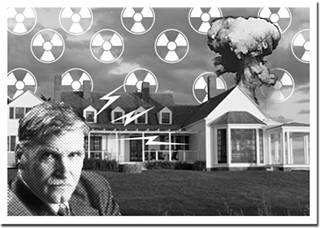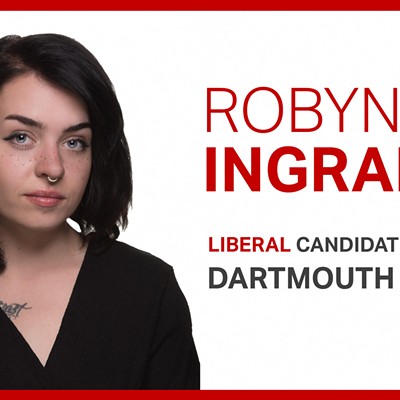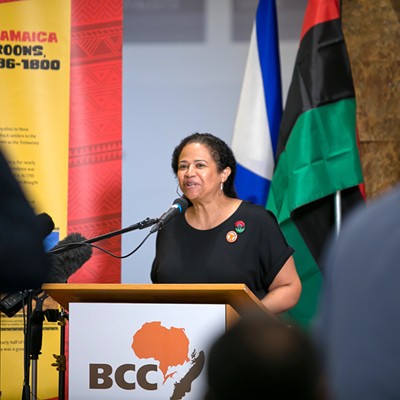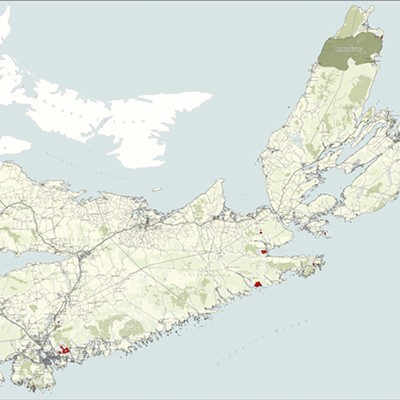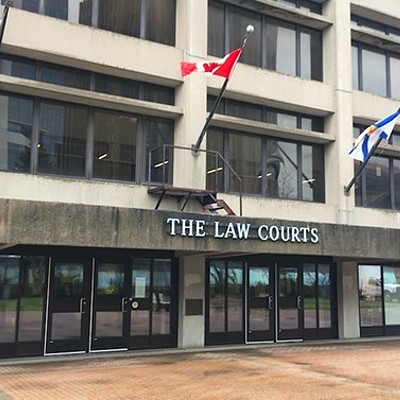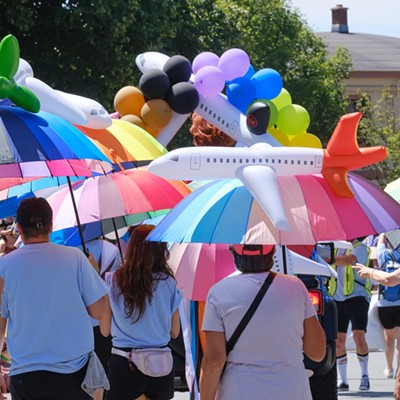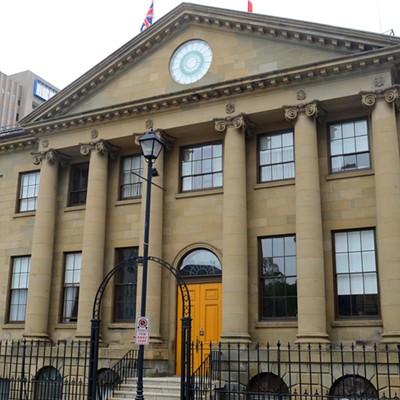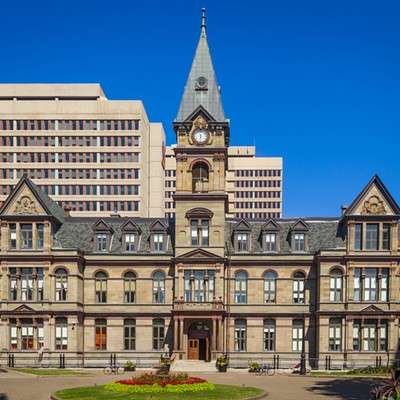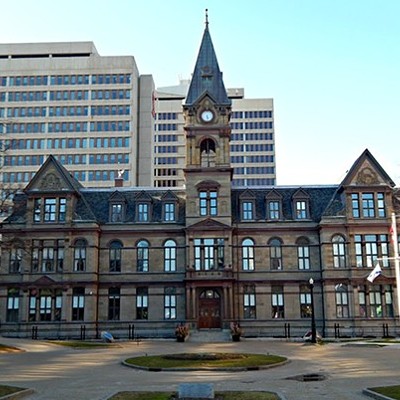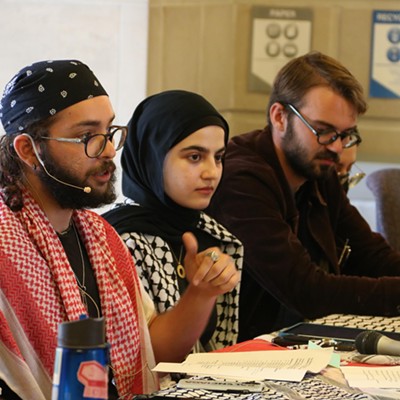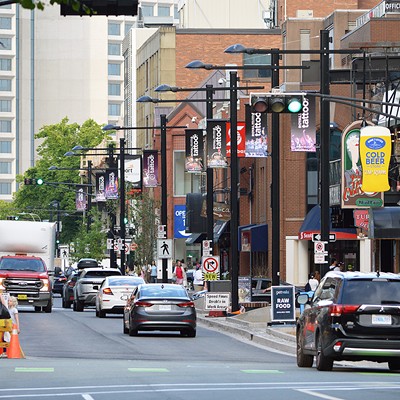Senator Roméo Dallaire wasn't thinking much about nuclear weapons when he got a call inviting him to become the Honourary Patron of the Pugwash Peace Exchange. But it didn't take much convincing.
"What I was working on (at the time) was massive crimes against humanity, which I continue to work on," says Dallaire on the phone from Ottawa, taking a minute to talk between meetings. "It struck me that the very existence of ...was a violation of our fundamental human rights. They go against what we say we need the weapons for. People say we need them for balance...to protect our security, but that's exactly what they're not doing. They only make us more vulnerable to the possibility of nuclear conflict."
After bringing the world's attention to the genocide in Rwanda, Dallaire is lending his experience and support to a problem many of us presume went away with the Cold War: the threat from nuclear weapons. Although the placard-waving days of "Ban the Bomb" may be behind us, the fact is that there are still 27,000 nuclear weapons on our little planet, 2,500 of which that can be ready to roll in under 30 minutes. The fact that we haven't blown ourselves up yet—either purposefully or by accident—is amazing; especially when you consider that three of the eight confirmed nuclear powers (India, Pakistan and North Korea) have not signed the Nuclear Non-Proliferation Treaty.
Dallaire will be in Pugwash this weekend, speaking as part of the fiftieth anniversary meeting of the Pugwash Conferences on Science and World Affairs. The internationally renowned organization brings together nuclear scientists and disarmament experts from around the world to discuss and seek solutions to global security threats. Twenty-five scientists from 15 countries will descend on the tiny town (population: 810) for a seaside strategy workshop on "Revitalizing Nuclear Disarmament." Pugwash, it seems, is world famous when it comes to world peace.
Many people have no idea the famous conferences were named for the tiny Nova Scotian town that spawned them. It was at the onset of the Cold War, in July 1957, when wealthy industrialist Cyrus Eaton invited a group of scientists from east and west to gather at his picturesque summer home (known ever since as the "Thinker's Lodge") to discuss peace. Inspired by a 1955 manifesto written by Albert Einstein and Bertrand Russell, the first meeting was organized by Joseph Rotblat, a scientist who helped design the first atomic bomb, then spent the rest of his life trying to undo the damage. The ground-breaking, behind-the-scenes international meetings the movement spawned are credited today with helping resolve the Cold War, earning Rotblat and the Pugwash Conferences a Nobel Peace Prize in 1995—one of only two to ever be won in Canada.
Rotblat died in 2005. This weekend, the Nobel Prize will be formally handed to the Pugwash Peace Exchange.
"There are three internationally famous villages," says Stephen Leahey, president of the Pugwash Peace Exchange. "Waterloo, Auschwitz and Pugwash." Born and raised in the latter, Leahey knew Eaton and remembers the groundbreaking first meeting. Now retired, he and his wife, Dennice, who divide their time between Halifax and Pugwash, are actively involved in bringing the public's attention to their village's peaceful accomplishments.
"Most Nova Scotians don't realize they are heirs to such intellectual wealth," says Leahey. Since 2003, they have been working toward the creation of the Pugwash Peace Exchange Educational Centre, a public facility that will teach the history of the Pugwash movement and serve as a research centre for international scholars. The $6 million centre, which they hope to have open by 2009, will be built on the grounds of Eaton's famous home. The centre's most important aim will be to stimulate discussion, moving forward, as Dennice puts it, "through education rather than lobbying."
"We can move and make progress on the environment," says Leahey, "but with one bomb it can all be obliterated. A couple of bombs could do more damage than climate change."
"People don't have a clue about the extent of the nuclear threat," says Halifax MP Alexa McDonough emphatically, clearly frustrated by the lack of governmental leadership on the issue.
For the last couple of years, McDonough, a longtime peace activist who also chairs the Parliamentary Network against Nuclear Arms, has also been working to raise awareness of the threat from nuclear weapons on a more local level. She has been trying to persuade Halifax mayor Peter Kelly to sign on to Mayors for Peace, an international organization of cities dedicated to the promotion of peace. First established in 1982 by the then-mayor of Hiroshima, Takeshi Araki, its current membership stands at 1,651 cities. Though Toronto, Winnipeg and Vancouver are among the 49 Canadian cities on the list, Halifax isn't.
"After Hiroshima and Nagasaki, the Halifax Explosion was the greatest man-made explosion in the world," says McDonough, "you'd think there would be some affinity —but no amount of trying to get the mayor of Halifax to join has produced one ounce of progress."
But Kelly is quick to defend himself as a "man of peace." The issue, he says, is that we live in a military town with more than 10,000 people working in the armed forces—and we have what he calls "NATO responsibilities."
"When a visiting ship is in the harbour, we know from time to time that there may be some nuclear capabilities on those vessels. I want to ensure that whatever action is taken has no impact of embarrassing our forces or naval fleet," he says diplomatically, "so I see some internal conflicts, for me, to try and find the best approach. If I'm going to sign a document, then I want it to be meaningful and not just blow smoke."
Though our mayor may be avoiding the issue, senator Dallaire suggests it's time to start asking some important questions about the impact that nuclear weapons have on our prospects for world peace.
"Why are we keeping these weapons?" he says bluntly. "They are totally surplus to requirement. How come people aren't worrying more about getting rid of them?"
He is particularly interested in targeting younger generations with his message because, he says, "the vestiges of another era are putting their fundamental concerns at risk."
As he prepares for this weekend's Pugwash anniversary, Dallaire says that Canadians—particularly young ones—need to begin flexing their democratic muscles on the issue of nuclear weapons.
"If they actually voted and imposed their will, you could see a significant change in policy. So when I hear them say they're not voting 'cause they aren't part of the political process, I say "J'accuse!'"
For more information on the conference, visit: www.pugwashpeaceexchange.org.

